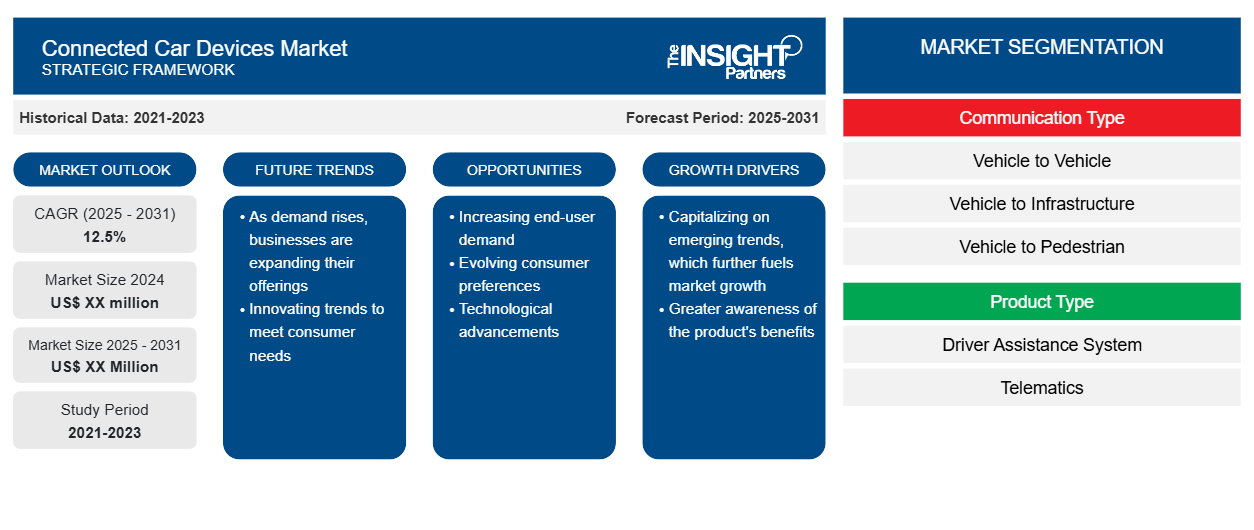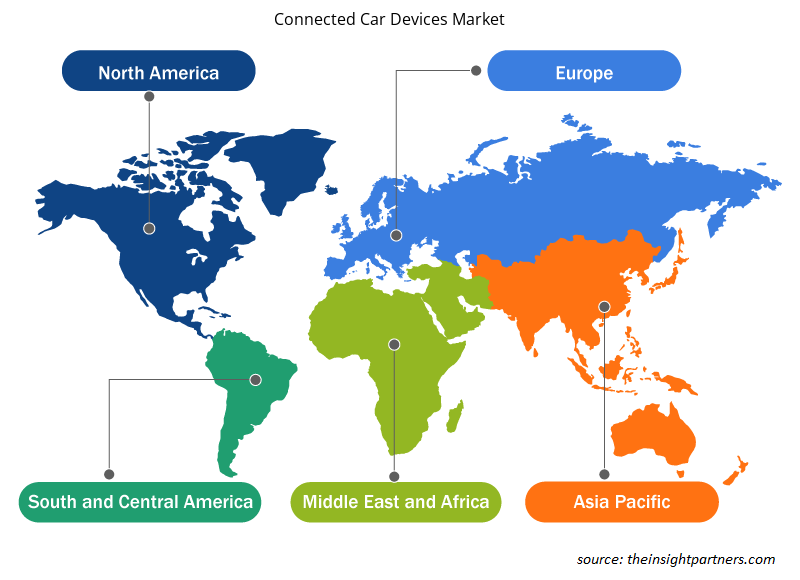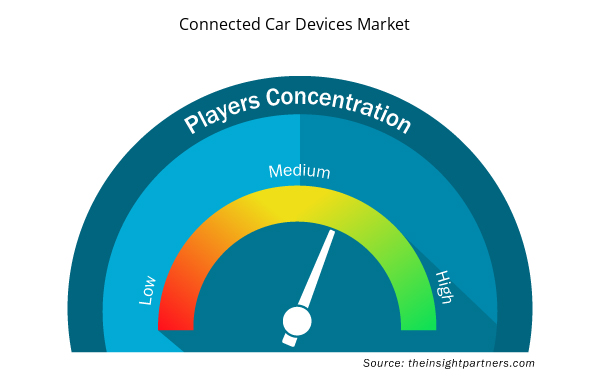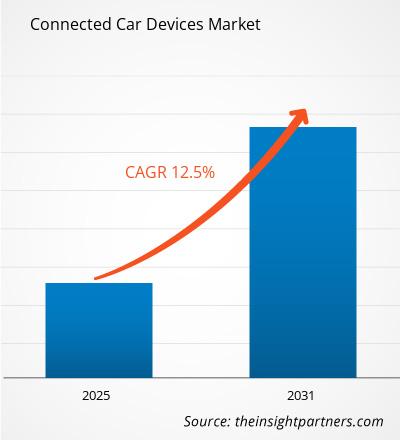The connected car devices market is expected to register a CAGR of 12.5% during 2023–2031. There is an increasing trend of electrification, automated driving, and connected vehicles driving the market for connected car devices.
Connected Car Devices Market Analysis
The increasing integration of vehicle automation and advanced technologies is driving the growth of the connected car devices market. This trend presents a lucrative opportunity for connected car devices, facilitating autonomous capabilities and inter-vehicle communication. Leading producers are collaborating to develop new vehicle tracking technologies for connected cars, fueling the adoption of advanced 4G and LTE technologies.
Increasing vehicle automation and advanced technologies also result in greater demand for connected car devices, hence pushing the growth of the connected car devices market. In a nutshell, connected car devices could be of great help in achieving the goal of autonomous vehicle capabilities and inter-vehicle communication. Different leading producers of connected car devices are further initiating all possible efforts to develop new vehicle tracking technologies for connected cars. The overall connected car market is also experiencing substantial adoption of advanced 4G and LTE technologies for connected cars because they can meet the requirements of future cars by transmitting more data packets and at faster rates.
Connected Car Devices Market Overview
The further development of vehicle automation will drive the next evolution of IoV that is emerging. The new IoV evolving patterns have physical sensors, machine-type devices, and vehicles as the IoV network users. For another, the automotive technology scaling will drive the development of L2-L5 EVs in drastic changes. L2–L5 EVs refer to different levels of automation defined by the Society of Automotive Engineers (SAE), for example, lane departure warning systems, adaptive cruise control, self-parking assistance, auto-pilot, and traffic sign recognition for self-driving cars.
Customize This Report To Suit Your Requirement
You will get customization on any report - free of charge - including parts of this report, or country-level analysis, Excel Data pack, as well as avail great offers and discounts for start-ups & universities
Connected Car Devices Market: Strategic Insights

- Get Top Key Market Trends of this report.This FREE sample will include data analysis, ranging from market trends to estimates and forecasts.
Customize This Report To Suit Your Requirement
You will get customization on any report - free of charge - including parts of this report, or country-level analysis, Excel Data pack, as well as avail great offers and discounts for start-ups & universities
Connected Car Devices Market: Strategic Insights

- Get Top Key Market Trends of this report.This FREE sample will include data analysis, ranging from market trends to estimates and forecasts.
Connected Car Devices Market Drivers and Opportunities
Increasing Penetration of High-Speed Technologies such as 4G and LTE to Favor the Market
The penetration of high-speed technologies such as 4G and LTE is highly significant in connected car devices market growth. This technology enables inter-vehicle communication and helps connected vehicles achieve autonomous capabilities. The ever-increasing speed of mobile communication and technology inside the connected cars are fuelling automobile manufacturers to offer more new and exciting services to the customers, which, in turn, is driving the dimension of this market.
Additionally, many of the test technologies integral to connected cars are being refined and honed along with the car itself. These technologies have to remain in top condition, operate reliably, and communicate with other systems at lightning speed. Automotive technology developers are using research to enable these connected and automated vehicles to sense and stop collisions. Sensing and avoiding collisions is a basic function for literally all connected and autonomous vehicles. The connected car devices market is experiencing growth. To conclude, the wide integration of vehicle automation and other advanced technologies is the major influence of the CCD market growth.
Autonomous Capabilities and Mobility Services
Autonomous self-driving vehicles that broaden the potential of rideshare and mobility services. Companies such as Waymo have launched paid rideshare services for those using autonomous self-driving vehicles on the road entirely without human intervention. Some ride-hailing services are expanding from specific geo-fenced areas into large metropolitan areas and cities, such as Phoenix, San Francisco, and parts of Los Angeles. Autonomous vehicles and vehicles running automated ride-hailing services are creating a rapidly growing demand for connected car devices and infrastructure. The advent of self-driving cars has also had a huge impact on IoT devices for the car market in particular, opening up a lot of opportunities for prospects, especially in the ridesharing and mobility services sector. Many companies such as Waymo, General Motors, and Ford are moving in this direction to have cars that can operate on their own and fleets that would be self-driving for rideshare purposes, and we predict this will potentially require a strong IoT backup since cars and IoT devices will need to be connected to access those autonomous services.
Connected Car Devices Market Report Segmentation Analysis
Key segments that contributed to the derivation of the connected car devices market analysis are communication type and enterprise size.
- Based on deployment type, the connected car devices market is divided into Vehicle to Vehicle, Vehicle to Infrastructure, Vehicle to Pedestrian, and Others.
- based on product type, the market is divided into Driver Assistance Systems, Telematics, and Others.
- based on vehicle type, the market is divided into Passenger Cars and Commercial Vehicles.
Connected Car Devices Market Share Analysis by Geography
Connected Car Devices Market Report comprises a detailed analysis of five major geographic regions, which includes current and historical market size and forecasts for 2021 to 2031, covering North America, Europe, Asia-Pacific (APAC), Middle East and Africa (MEA), and South & Central America. Each region is further sub-segmented into respective countries. This report provides analysis and forecasts of 18+ countries, covering connected car devices market dynamics such as drivers, trends, and opportunities that are impacting the markets at the regional level. Also, the report covers PEST analysis, which involves the study of major factors that influence the connected car devices market in these regions.
Connected Car Devices Market Regional Insights
The regional trends and factors influencing the Connected Car Devices Market throughout the forecast period have been thoroughly explained by the analysts at Insight Partners. This section also discusses Connected Car Devices Market segments and geography across North America, Europe, Asia Pacific, Middle East and Africa, and South and Central America.

- Get the Regional Specific Data for Connected Car Devices Market
Connected Car Devices Market Report Scope
| Report Attribute | Details |
|---|---|
| Market size in 2024 | US$ XX million |
| Market Size by 2031 | US$ XX Million |
| Global CAGR (2025 - 2031) | 12.5% |
| Historical Data | 2021-2023 |
| Forecast period | 2025-2031 |
| Segments Covered |
By Communication Type
|
| Regions and Countries Covered | North America
|
| Market leaders and key company profiles |
Connected Car Devices Market Players Density: Understanding Its Impact on Business Dynamics
The Connected Car Devices Market market is growing rapidly, driven by increasing end-user demand due to factors such as evolving consumer preferences, technological advancements, and greater awareness of the product's benefits. As demand rises, businesses are expanding their offerings, innovating to meet consumer needs, and capitalizing on emerging trends, which further fuels market growth.
Market players density refers to the distribution of firms or companies operating within a particular market or industry. It indicates how many competitors (market players) are present in a given market space relative to its size or total market value.
Major Companies operating in the Connected Car Devices Market are:
- Continental AG
- Delphi Technologies
- Denso Corporation
- Infineon Technologies AG
- Magna International Inc.
Disclaimer: The companies listed above are not ranked in any particular order.

- Get the Connected Car Devices Market top key players overview
Connected Car Devices Market News and Recent Developments
The connected car devices market is evaluated by gathering qualitative and quantitative data post primary and secondary research, which includes important corporate publications, association data, and databases. A few of the developments in the connected car devices market are listed below:
- HARMAN, a global leader in connected vehicle solutions, today announced the launch of the HARMAN Ready Connect 5G Telematics Control Unit (TCU), leveraging state-of-the-art Snapdragon® Digital Chassis™ connected car technologies from Qualcomm Technologies, Inc. to push connectivity boundaries and democratize the automotive connectivity landscape. Based on the Snapdragon® Auto 5G Modem-RF Gen 2, HARMAN Ready Connect 5G TCU represents a significant advancement in automotive connectivity, delivering rich in-cabin experiences for consumers while reducing time to market and engineering efforts for OEMs. HARMAN Ready Connect 5G TCU is currently available and will be showcased this week at Mobile World Congress (MWC) 2024. (Source: HARMAN International, Company Website, February 2024)
Connected Car Devices Market Report Coverage and Deliverables
The “Connected Car Devices Market Size and Forecast (2021–2031)” report provides a detailed analysis of the market covering below areas:
- Connected car devices market size and forecast at global, regional, and country levels for all the key market segments covered under the scope
- Connected car devices market trends as well as market dynamics such as drivers, restraints, and key opportunities
- Detailed PEST/Porter’s Five Forces and SWOT analysis
- Connected car devices market analysis covering key market trends, global and regional framework, major players, regulations, and recent market developments
- Industry landscape and competition analysis covering market concentration, heat map analysis, prominent players, and recent developments for the connected car devices market
- Detailed company profiles
- Historical Analysis (2 Years), Base Year, Forecast (7 Years) with CAGR
- PEST and SWOT Analysis
- Market Size Value / Volume - Global, Regional, Country
- Industry and Competitive Landscape
- Excel Dataset



Report Coverage
Revenue forecast, Company Analysis, Industry landscape, Growth factors, and Trends

Segment Covered
This text is related
to segments covered.

Regional Scope
North America, Europe, Asia Pacific, Middle East & Africa, South & Central America

Country Scope
This text is related
to country scope.
Frequently Asked Questions
Some of the customization options available based on request are additional 3–5 company profiles and country-specific analysis of 3–5 countries of your choice. Customizations are to be requested/discussed before making final order confirmation, as our team would review the same and check the feasibility.
The report can be delivered in PDF/PPT format; we can also share the Excel dataset based on the request.
The leading players operating in the connected car devices market are Continental AG (Germany), Delphi Automotive (UK), Robert Bosch (Germany), Denso Corporation (Japan), and ZF Friedrichshafen AG (Germany).
There is an increasing trend of electrification, automated driving, and connected vehicles driving the market for connected car devices.
The global connected car devices market is expected to grow at a CAGR of 12.5% during the forecast period 2023 - 2031.
The penetration of high-speed technologies like 4G and LTE is highly significant in connected car devices market growth.
Trends and growth analysis reports related to Automotive and Transportation : READ MORE..
The List of Companies
1. Continental AG
2. Delphi Technologies
3. Denso Corporation
4. Infineon Technologies AG
5. Magna International Inc.
6. Panasonic Corporation
7. Robert Bosch GmbH
8. Valeo
9. Visteon Corporation
10. ZF Friedrichshafen AG

 Get Free Sample For
Get Free Sample For